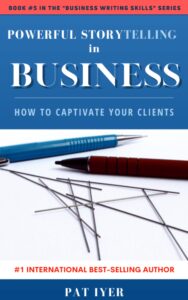 Remember how you felt as a kid when you heard stories? For my sons it was a highlight of their days when I read stories to them.
Remember how you felt as a kid when you heard stories? For my sons it was a highlight of their days when I read stories to them.
Legal nurse consultants excel in helping the attorney tell a story. Every trial begins with an opening statement that lays out the attorney’s version of the plaintiff’s story. Both the plaintiff and defense attorneys use their opening statements to capture the attention and persuade the jury.
Using Stories in Medical Reports
Your role is often telling the story of the plaintiff’s care – either as an expert witness, an expert fact witness, or a consulting LNC.
How do you make your reports interesting and compelling to help the attorney client?
Suppose you’re writing a factual piece. You have lists, both numbered and bulleted. You have details galore.
Obviously, factual stories demand facts, and sometimes a writer can’t find ways to buffer them.
One of the best methods is to include stories.
Be descriptive
Compare these 2 descriptions:
Version 1
The patient was a 52-year-old man with a past medical history of hypertension and diabetes. He was involved in a rear end collision on September 18, 2018.
Version 2
Jose Gonzales was 52-year old man on September 18, 2018. He worked as an accountant, was married and lived in a single story home. He enjoyed playing baseball with his daughter and worked out in the gym every other day. He took Bumex for his hypertension and Metformin for his diabetes.
According to the police report, at 8:30 AM, Mr. Gonzales was stopped at a traffic light when his car was rear ended by a car driven by Grace Gurner.
The second version provides many more details and begins to tell the story of Mr. Gonzales’ car crash.
People love stories. A good story can bring facts and theories to life in a way that lists, statistics, and other forms of information sharing can’t achieve.
Stories activate our powers of imagination and emotion. When we read about the experiences of others, we get involved. We feel empathy, whether the story is sad or happy.
Your analysis of the medical records reveals the plaintiff’s story. You may find vivid details that influence the case. For example, in a product liability case that involved analyzing hundreds of medical records, one set of medical records stood out. The liability issue involved loose hardware and migrating spinal screws. One of the plaintiffs with loose hardware was driving when the rods in his back broke through his shoulders. I shared this horrifying description with the defense attorney (our client) to warn him about the graphic nature of this man’s damages.

Using Stories in Marketing
You work for or own Company A. Imagine a river between you and the customers you want to gain. How do you get them over to your side? You do this by going over to their side.
A story can do this. It can say, “I know how you feel. I know what you worry about. I can help you. Let me tell you a story about a case I worked on and how the attorney was able to settle the case for a significant sum.”
How I Used Stories As Part of My LNC Strategy
As a nurse legal consultant, I included stories in the blogs I wrote and when I spoke to attorneys about my services. I did this for several reasons.
I Showed the Results my Clients Achieved with My Services
When I worked for a plaintiff’s lawyer, I wanted the plaintiff to receive financial reimbursement for his/her pain, suffering, and possible long-term disability. If I worked for the defendant’s lawyer, I might be fighting for a medical professional who had been wrongly accused of malpractice.
I described the cases to make it clear that I cared about the people involved. I wanted them to receive the justice they deserved. By demonstrating my commitment to my clients, I showed that I would give my all for future clients.
My Stories Highlighted My Abilities
Through describing successful cases, I indirectly showcased my professionalism and proficiency. I let potential clients know about the breadth and depth of my abilities. I could also emphasize particular services my company offered.
My use of stories helped to steadily build my business. It can help to build yours. Remember that ultimately your business is about people. Tell them stories that they’ll remember—and they’ll remember you.
Interested in learning more about using stories for selling your services?
Once upon a time . . .
As an expert medical witness, I had to convey to juries the pain and suffering a victim of medical malpractice experienced. I integrated the storytelling skills I developed in my career as an editor, ghostwriter, writing coach, and the author of more than 60 books.
In addition, I interviewed storytelling experts with their own perspective on the art of telling a story and assembled their collective wisdom in Powerful Storytelling in Business: How to Captivate Your Clients.
 In this book, you’ll learn how to:
In this book, you’ll learn how to:
• Tell stories about your experiences while keeping the focus on your audience,
• Show your learning points by engaging your audience with a memorable story instead of boring them with a recitation of dry facts,
• Increase your ability to persuade others through a variety of story frameworks,
• Practice studying the construction of these frameworks through spotting them in the stories included in the book,
• Outline your stories so that you can make sure you’ve constructed them in a way that makes your message clear and powerful,
• Make your stories more powerful by weeding out redundant and weak words in your stories, adding emotions, and appealing to the senses,
• Collect useful stories from your family history, your life, sources like Reader’s Digest, People magazine, and newspaper and online sources.
When you become comfortable with writing and sharing stories, you enjoy watching people lean in to hear more, and you appreciate fan messages. You realize the power of stories to changes lives.